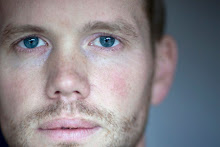Giselle Vegter is a theatre maker who makes performances about topical issues. During Festival a/d Werf she will show RUMOR, a play that will take place in a busy square, behind the central train station of Utrecht. Several performers will be portraying characters and interacting with each other in the middle of the square. They will be watched by a group of spectators from the lounge of a theatre, located in the second floor of a building that looks over the square. This piece premiered last year in Linz, Austria.
In this play you have two different sets of spectators, can you tell me a bit more about how that works?
There is the real audience, who are somehow treated like voyeurs. They are hidden, standing in a place above in a building, so you can't see them from the street. And there are also people looking at this from the street. And the ideal situation would be that they don't know that there is theatre going on, that it doesn't draw too much attention. Although sometimes it will because there are some conflicts among the characters and because it is impossible to play something in the street that is fully natural. Every time an actor starts a dialogue in the streets there is somehow another tension. But that is also what is interesting about it. It is also good if people can realize that there is something different going on. Probably they won't really know what it is and most of them will just walk on. And these people passing by are also being looked at, of course. They are unintentionally walking into a theatre play.
How did people react to this in Austria? Did people believe into the reality of the play?
Partly, with some roles yes but less with others. For example, everybody thought that the homeless man was real but this happened less with the youngsters. You could see that they were acting and that what they were doing was not really true. So that is why I will try to make it more subtle this time, more natural although it will still be theatrical.
How did you develop the idea for this play?
Well, I like to look at people on the street and I think everybody does. I started imagining how it would be if we could all know what is going on inside the heads of the strangers around us, or what their stories are. If you go to the central train station, there are so many individual longings and stories and if you look at the faces you see already a lot, but sometimes I like to fantasize more about them. And then I started thinking what would happen if you could turn these individual longings into a theatre piece and put it in the middle of reality and then allow people to look at this for a while. And I think that I'm also questioning the way theatre is positioning itself against real life. Often when I see a theatre piece, I think it has nothing to do with real life. So I think we should make theatre -or, at least, I would like to make theatre- that has a closer connection with the reality that we are living in. I am looking for ways to translate this, to find and tell stories that have a strong connection with our world.
What role should theatre play in society?
It should have a critical role. We should reflect and go further, bringing in new thoughts about the world that we're living in and about ourselves. What I like about theatre, and about art in general, that it is somehow outside of the system and we have great freedom there. And I would like to use this freedom in a conscious way.
Would you say that your work is political?
If you think of political work as a way of making things clear or raising awareness then I would say yes although I would rather call it societal. Once, for example, I made a performance for children about transience (vergankelijkheid). And it is not a political story but it is about how we deal with people who suffer from memory problems, and that makes it relevant to our society.
Your piece seems to also tackle issues about surveillance and exposure, and about a distinction between the private and the public that is becoming increasingly blurry.
Absolutely. We are being watched and exposed continuously, and we are also becoming uneasy about this. We are becoming increasingly afraid of being exposed. I think we are being disturbed by this and we don't always know how to deal with it. An example of this is mobile phones, that people are using to speak their private lives out in public. And they are featured extensively in the performance.
Wednesday, May 19, 2010
Subscribe to:
Post Comments (Atom)



Nice interview! Good job Miguel!
ReplyDeleteHope to see you all at our performance RUMOR this week.
Het Lab Utrecht